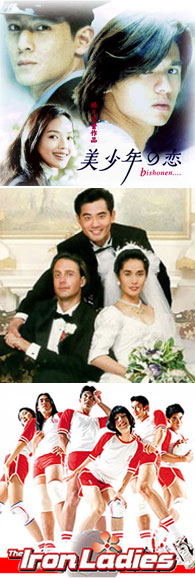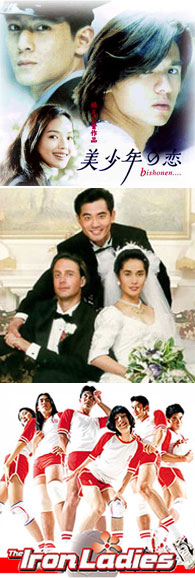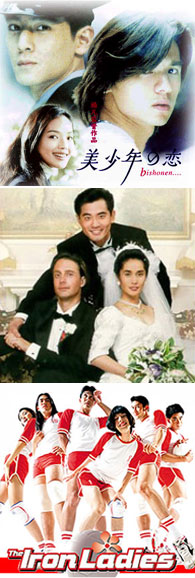Since the mid-eighties, gay characters in films from the Pacific Rim have been one of either two things: incredibly boring, or incredibly boring.

From the top: Bishonen, The Wedding Banquet and The Iron Ladies
Or they're pushed the other way, and spend the whole length of films like Philadelphia or The Next Best Thing pushing socio-sexual agendas which invariably land them in court, where they deliver robotic monologues before dying dramatically and/or ending up with nothing.
Down under, gay characters often tumble into the inescapable vortex of Australian movie eccentricity, where everyone's a ballroom dancer, a drag queen, or both, and no one is taken too seriously.
Some independent filmmakers manage to dodge these cliches, only to fall into the trap of being too earnest. The lead characters of Head On and Hedwig And The Angry Inch are consumed by their sexuality, to the point that they have no other discernible function except to find a way to be gay, and preferably be happy about it.
Gay characters in films coming out of Asia during the past decade, however, form a much more interesting group. Films from The Wedding Banquet and Farewell My Concubine to Happy Together and Bombay Boys contain complex and individual characters, who are never in the mould of their blander western counterparts, and who are given a much more promising location in their nation's cultures.
1994 was the first big year for Asian gay cinema, and by many measurements, still its best, as it was the year when The Wedding Banquet, from Taiwan, became a popular box office hit around the world, and Farewell My Concubine, from China, won the Palme D'Or at the Cannes Film Festival. At that year's Oscars, both films competed against each other for Best Foreign Language Film (neither won).
What these two very different films had in common was the way the experiences of their gay characters parallelled the histories of their respective countries. Farewell My Concubine's "Douzi" plays female roles in the ancient Peking Opera, and early on forgets how to split life and art, falling into a lifelong unrequited love for his stage partner, and inadvertently weaving his way through the history of twentieth century China. The gay couple in The Wedding Banquet was typical of many Taiwanese in the early nineties - upwardly mobile careerists, who immigrated to the United States and/or experimented with non-Confucian lifestyles and belief systems.
This was a very unusual connection for cinema, as gay characters in non-Asian films have been granted only the most tenuous connection with their national culture.
Gay characters in western films tend to be exiled to Gay World, their own cultural island-country where "being gay" is the main, often the only, element of their identity. Philadelphia is the prime example of a gay character severed and adrift from his countries culture and laws, while even The Sum Of Us, from Australia, was at pains to point out that it was possible to be a regular Aussie bloke and still love your gay son.
Subsequent Asian gay films have not been as successful at either box office or award nights, but the exploration of gay culture as a part of national culture continues to evolve, and their gay characters have become increasingly complex. What the success of The Wedding Banquet and Farewell My Concubine also fostered was an increase in the presence of Asian gay films. The 2002 San Francisco Gay and Lesbian Film Festival identified a "tsunami" of gay-themed films coming out of Asia, and films from Hong Kong, like Happy Together and Bishonen have won much acclaim around the world.

From the top: Bishonen, The Wedding Banquet and The Iron Ladies
Some celebrated recent gay films don't do much more than play around with existing ideas of gay life in the big city. Head On, set in Melbourne, features a main character "Ari", who struggles with identity and happiness, but does so mainly in gay discos, beats and the family home. "Ari" might be looking for something new, but he's looking in all the same old places. Trick, set in Manhattan, is more optimistic and romantic, but likewise features lead characters who stay within already established rules. (They meet in a gay bar, consult their networks of gay friends, and have an established language of cruising and flirting that lubricates their every interaction.)
In Happy Together, geography floats - it's incidental. One minute Argentina is visible out the window, the next minute we're in a Korean night market. At the film's end, we're on a Hong Kong commuter train. The setting is colourful, and interesting, but the focus is on the characters, who lack familiarity with their surroundings. There's no swelling music accompanying panning shots of the city, no key railway or airport scenes. The film isn't set in a recognisable geographic or cultural container, the familiar big cities of the western world, like Melbourne or New York, where gay people have established cultural templates.
As for gay culture, it's almost totally absent - invisible, irrelevant. In Argentina, the pair doesn't frequent the local gay bars, or fall in with a group of buff, well-adjusted gay friends. Rather, they try out life in a new, untested space, one that lacks the formal borders and rules of "home". In my opinion, this makes Happy Together an allegory to increasingly stale and redundant gay culture, which itself could benefit from moving into some new cultural spaces, and jettisoning its familiar, outdated "home" environment of the gay bar, the pride march and so on.
Like Farewell My Concubine, Happy Together frames its story against a factual historical backdrop, in this case, the 1997 return of Hong Kong to Chinese administration. Does this correlation in Happy Together suggest that gay culture is just as eligible for rejection or revaluation as national identity often is? Does the film hint at the idea that established gay community identity is as expired, and on the verge of dramatic change, as was the Hong Kong of 1997?
Whatever the case, Asian gay films tend to depict gay culture as an integral element of mainstream culture, whereas western films usually show it as a foreign element that demands acceptance. As an example, the matter-of-fact attitude of an Asian film like Happy Together to its gay subjects is a long way different from the upfront and spotlit approach of Priscilla: Queen of the Desert.

From the top: Bishonen, The Wedding Banquet and The Iron Ladies
The Iron Ladies won handfuls of Audience Favourite awards at international Gay and Lesbian Film Festivals, and was a healthy box office hit in Thailand and elsewhere. But it's a long way from Farewell My Concubine, and it lacks the edgy sophistication of Bishonen, Happy Together or Lan Yu. Its success at first looks disappointing - as though inventive Asian gay cinema has caved in to the pressures of commercialism, where gay people need to be funny, friendly or politically engaged if they're going to appear in the movie. But there is more to the success of a film like The Iron Ladies than slapstick stereotypes. The film doesn't signal the beginning of a regressive trend for Asian gay characters, as Chris Berry, a teacher of film studies at the University of California, Berkeley, explains.
"There have been plenty of examples of derogatory representations of comic gay characters aimed at heterosexual audiences in mainstream Asian cinemas over the years," says Berry. "But a mainstream film that depends on its audience sharing the perspective of its gay protagonists, which is pretty much what happens with The Iron Ladies is unusual. It might not be high culture, but it's significant in this way."
And there's a reason why low budget, "ethnic" films like Monsoon Wedding, My Big Fat Greek Wedding and Muriel's Wedding make it big at the box office. It's not coincidental that they're all about weddings: fizzy feel good films sell. As we say in Australia, they put "bums on seats". Ultimately, The Iron Ladies has more in common with a film like Cool Runnings, a comedy about a misfit Jamaican bobsled team, than it does with Priscilla.
Gritty realism doesn't lead to high box office, and high box office is what gets producers interested in projects. So it's not just censorship that prevents institutions like the Singapore Film Commission championing Forever Fever while banning Happy Together. Like it or not, light films like The Iron Ladies may end up outnumbering more challenging independent films, because the money-paying audience, on the whole, wants to have a good time. But with Asian cinema gathering an increasingly serious commercial presence around the world, at least Asian filmmakers have the opportunity to get their gay characters right from the beginning.











 打印版本
打印版本











读者回应
抢先发表第一个回应吧!
请先登入再使用此功能。